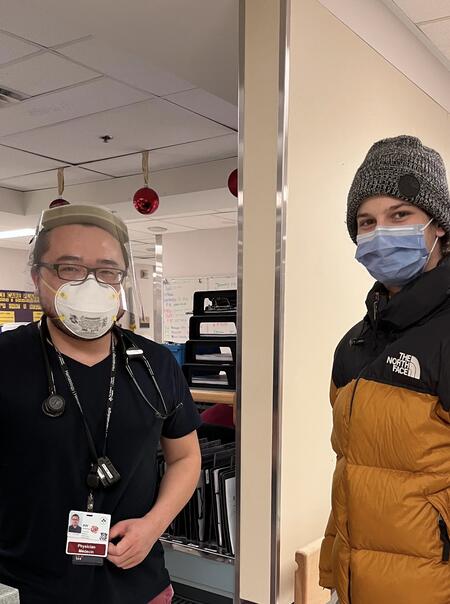
Keegan Morin: The Importance of Follow-Up Care: Preventing and Managing Late Effects
continuation of the care that saved my life.
Cancer treatment may end, but its effects can last for years, which is why follow-up care is essential.
It’s not just about checking for relapse, but it’s also about monitoring, preventing, and managing the
long-term effects of treatment. These appointments help survivors stay informed, catch potential
complications early, and take proactive steps to maintain their health.
For me, follow-ups have always been a priority. They are more than routine check-ins; they are a
continuation of the care that saved my life. My oncology team isn’t just there to monitor my health;
they genuinely care about my well-being and future. Seeing patients thrive after treatment is
meaningful to them, and I wouldn’t be where I am without their guidance. My
oncologist/hematologist, Dr. Andrew Aw, MD, as seen in the picture, has been my biggest inspiration.
During my treatment, we’d talk about the science behind lymphomas all the way down to the cellular
level which made me so curious and genuinely interested. He showed me what real patient care looks
like, and I hope to one day use my own experience in medicine to help others the way he helped me.
One of the main reasons follow-ups matter is to prevent and manage late effects and long-term
complications from cancer treatment that can affect different systems in the body. For example, chemo
brain is a well-documented condition affecting memory, concentration, and cognitive function.
Research suggests that chemotherapy may cause neuroinflammation and changes in brain structure,
leading to difficulties in processing information. Follow-up care allows doctors to track cognitive
changes and provide strategies to manage them, such as cognitive exercises and organization
techniques.
Another common issue is peripheral neuropathy, which occurs when chemotherapy damages the
nerves, causing tingling, numbness, or weakness in the hands and feet. While I no longer experience
it, I know how disruptive it can be. Follow-ups help assess nerve function and offer treatments or
lifestyle changes to manage symptoms and prevent long-term damage.
Additionally, cardiovascular and metabolic health can be impacted by treatment, increasing the risk of
heart disease or metabolic disorders. Regular follow-ups allow doctors to monitor heart function and
overall health, providing early interventions when necessary.
Survivorship isn’t just about finishing treatment, it’s also about maintaining long-term health and
quality of life. If you’re a survivor, don’t skip your follow-ups. They provide essential medical care,
support, and reassurance that you’re not alone in this journey. Taking charge of your health now will
help ensure a healthier future.